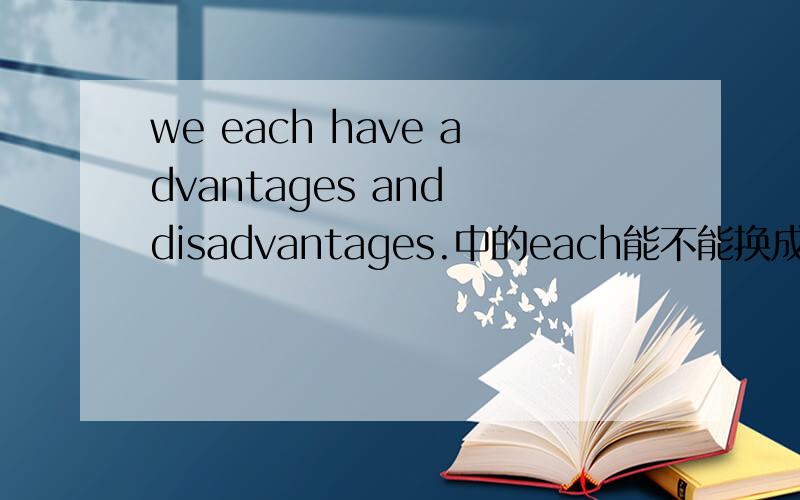we each have advantages and disadvantages.中的each能不能换成every.还有,为什么have不用单数
来源:学生作业帮助网 编辑:作业帮 时间:2024/11/30 20:26:53

we each have advantages and disadvantages.中的each能不能换成every.还有,为什么have不用单数
we each have advantages and disadvantages.中的each能不能换成every.还有,为什么have不用单数
we each have advantages and disadvantages.中的each能不能换成every.还有,为什么have不用单数
当然不能!
we each,each作为同位语,是代词,而every不行.
句子真正的主语是we,其后的each是主语的同位语,由于谓语是与主语保持一致(而不是与其同位语保持一致),所以此句要用have.
这是一大易错点,牢记!
1.从含义上区别:
each和every都有“每个”的意思,但侧重点不同,each着重个别的情况,every着重全体,有“所有的”意思。
eg. She knows each student of the class. 她认识班级中的每个学生。
She knows every student of the class. 她认识班级里的所有学生。
2. 从词性...
全部展开
1.从含义上区别:
each和every都有“每个”的意思,但侧重点不同,each着重个别的情况,every着重全体,有“所有的”意思。
eg. She knows each student of the class. 她认识班级中的每个学生。
She knows every student of the class. 她认识班级里的所有学生。
2. 从词性上区别:
each 可以做形容词,也可以做代词(可与of 连用),可以用作主语,宾语,同位语。作主语时,谓语动词用单数形式。
eg. Each of them doesn't smoke. (主语)
The teacher asked each student . (宾语)
We each have a holiday. (同位语)
every 只作形容词,只能与名词连用。
eg. Every boy has a book on the desk.
we——我们;这个单词是复数形式,所以不能用第三人称单数形式的has,而要用原型have
收起
we each have advantages and disadvantages句子主语是we不是each,所以用have.
each不能换成every each做同位语,every没这种用法